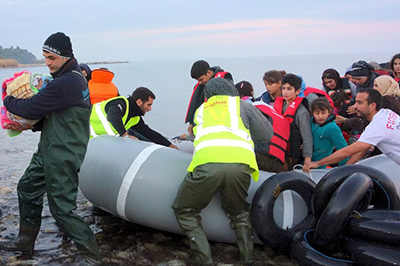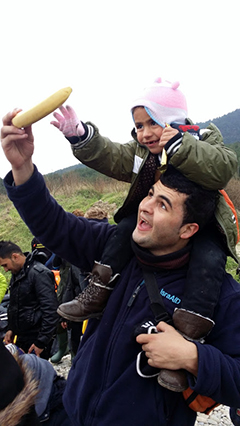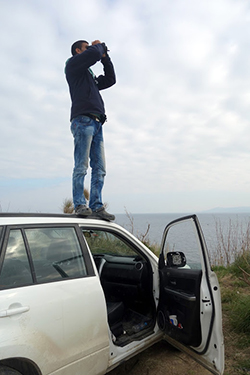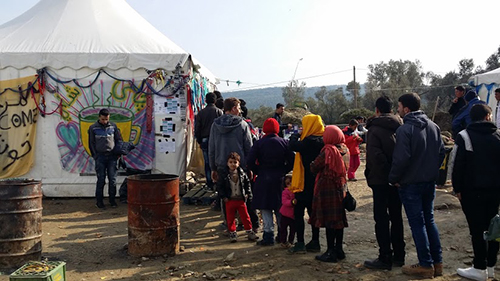Wider World
Feature
Lesbos: Where Arab Refugees Meet Israeli Rescuers

The little girl in the pink woolen hat gives a halfhearted smile as though she knows she is one of the lucky ones. She has just arrived with some 40 men, women and children on a gray rubber dinghy meant for a dozen passengers. The next day, on a voyage along the same route, a boat would capsize, cutting short the dreams and lives of 37 passengers. But on this overcast winter morning, a group of Syrian and other refugees from the Middle East can breathe a sigh of relief, having made the short but perilous six-mile journey from the western coast of Turkey to the Greek island of Lesbos.
A burly Israeli paramedic wearing a dark ski cap has been pacing nervously, waiting for the boat to reach the rocky shore of the island. Now, donning rubber boots, he rushes into the water and begins lifting children out of the dinghy and carrying them to the shore. Most are dazed, some are crying, a couple look curious.
The girl in the pink hat does not seem to have her mother with her. She clings to the barrel-chested man. He offers her a banana and carries her in his arms until there is no trace of fear left in her eyes.
Such encounters between Syrians and Israelis take place daily on Lesbos. The island is a lighthouse of hope for many, a watery grave for others and a setting for ironic twists of fate—like the one in which a 2-year-old from Syria is welcomed to European soil by a man from Israel.

For Molham Zreqe—who held the girl until her father reached the shore—coming to Lesbos was the natural thing to do.
“Why should I sit at home watching the suffering of Syrians or any other refugees on television when I can actually do something to help?” asks 22-year-old Zreqe, a Muslim Arab paramedic from the small town of Kfar Kana. Zreqe is one of over 60 Israelis, most of them volunteers—both Jews and Arabs—who have come to Lesbos since September 2015 to help refugees under the auspices of IsraAID, an Israeli nongovernmental organization that provides emergency aid and long-term support to victims of natural and manmade disasters worldwide.
To address the current refugee crisis, the nonprofit organization—founded by a young Israeli, Shachar Zahavi, in 2001 and funded by UNICEF, various businesses, foundations, Jewish federations and individual donors—set up teams in a number of locations: Jordan, Iraq (Kurdistan), Northern France, mainland Greece, Lesbos and, most recently, Germany.
Naama Gorodischer, global programs director of IsraAID, arrived in Lesbos last September to see the situation firsthand. “It was sheer chaos. There were thousands of refugees arriving daily and everyone, including the mayor, was totally overwhelmed. There were many volunteers and a lot of good will, but very little strategy and no one spoke the language of the refugees,” recalls Gorodischer. “I knew we had a unique combination of skills: We have experience providing medical and psychosocial support in an emergency, and we could do that in the mother tongue of the refugees. We felt it was our duty to send a team over.”
At any one time, about a dozen IsraAID volunteers with medical or social work skills are based on Lesbos, an island in the Aegean Sea that is home to some 85,000 Greeks. Over half a million refugees—about 50 percent from Syria, 30 percent from Afghanistan and roughly 15 percent from Iraq—have arrived in Lesbos since Sep-tem-ber alone. Even now, as various European countries take steps to close their gates, the refugees keep coming. In March, the tally ranged from 50 to 1,400 a day, fluctuating according to the weather conditions and whims of smugglers on the Turkish side. “We plan to keep a team on the island as long as we see the need,” says Gorodischer.
Most of the refugees stay on the island only a few days before heading off by ferry to the Athens port of Piraeus. From there they have until recently been heading to nor-thern Europe, hoping to start new lives, primarily in Germany or Austria.

But by the time they get to this island many are injured, traumatized or both. “The most common conditions you will encounter are panic, hypothermia and stab wounds,” says male nurse and team member Malek Abu Grara, 22, coaching two new medical volunteers who have just arrived from Tel Aviv and Modi’in.
The stab wounds are often incurred during the journey through Turkey, the result of altercations with smugglers who charge from $1,200 to $2,200 a person for a place on a boat, and sometimes force refugees at gunpoint to board overcrowded, flimsy vessels.
“There are parents who arrive after having lost a child, or children who arrive having lost one or both parents—usually as a result of a shipwreck,” explains Warda Alkrenawy, 35, a social worker from the Bedouin town of Rahat in the Negev Desert. “I accompany refugees who have to identify the body of a family member—and then I stay with them, visiting them every day, crying with them and trying to help them regain their strength until they are ready to continue their journey.”
Alkrenawy works mainly at two of the three refugee camps on the island and was one of the first Arabic-speaking volunteers there. She recalls one bereaved mother who would faint every few hours after losing her daughter at sea. “I stayed with her every day until the color returned to her face and she was able to tend to her other children,” says Alkrenawy.
Team leader Manal Shehade, a Christian Arab from Nazareth fluent in English, Hebrew and Arabic, also notes that the team from Israel brings especially relevant skills to the mission. “We understand how to handle trauma because we are a people—whether it’s Palestinians or Israelis—who have suffered trauma,” she explains. “As a people who come from an area of conflict we know how to work in stressful situations.”
About half the team members, like her, are native Arabic speakers. Several of the Jewish team members also speak Arabic. One—Inbal Baron, whose grandparents hail from Afghanistan—also speaks Farsi, enabling her to communicate with most of the Afghan refugees. On a typical day, she can be found at the Moria refugee camp set up by Greek authorities at a former army base near Mytilini, the capital of Lesbos. At the camp, Baron—who has a Master’s degree in Middle East studies from Tel Aviv University—uses her language skills (English, too) to help refugees at the medical clinic, information booth and clothing tent.
Four sisters approach Baron with a question: One of them has soaking wet shoes and they want to know if she can get replacements. Speaking in Farsi, Baron tells them when the camp’s clothing tent will open. The girls, ages 10 through 16, are from a remote region in Afghanistan. They are traveling with their brother, also 16; their parents have stayed behind in Afghanistan.
The girls had not been to school in four years, one of the reasons they left. “As girls, they were not allowed to leave the house under the Taliban,” says the brother. When they are asked what they hope to do in Europe, the girls all blurt out in unison: “Madrase” (school). “And work outside the home!” one of them pipes in, with enthusiastic nods from her siblings.
Twenty-six-year old Amir Alifrom the Daykundi region of Afghanistan also needs shoes. “Someone took mine when I went to the shower,” he tells Baron, pointing to the sandals he is wearing on a crisp winter day. He fought alongside American forces in Afghanistan and fled when the Americans pulled out troops. “The Taliban asked if I would join them—and I told them ‘never,’” he recounts. Ali went into hiding, but the

Taliban came to his home and murdered his mother and young sister in revenge. Now he is traveling with one of two brothers—the other got lost “somewhere in Iran.” Ali is heading to Germany. His goal is modest: “Just to save my life.”
Baron will get him a pair of shoes for the journey.
The diversity of the IsraAID team—which includes Jews, Christians and Muslims, people who define themselves as Israeli or Palestinian or both as well as some Americans—makes the group unique, even among the dozens of aid workers from a host of countries. “We’re odd ducks compared to the other volunteers on the island, most of whom tend to be tall and blond,” quips Shehade, a small woman with a mane of dark black curls.
International organizations and volunteer groups, mainly from Europe, have set up a few medical clinics for refugees. The IsraAID team packs all its tools—from defibrillators and ventilators to oxygen masks and assorted medications—into a vehicle, enabling them to treat refugees immediately when they arrive on the shore, wherever they arrive. “We’re good at improvising,” says Dr. Richard Lapin, 49, a Jewish doctor who made aliya from the United States five years ago. He is on his third tour of duty in Lesbos.
Dr. Lapin recalls a night in November when all the medical teams mobilized to receive a boat in distress at a main beach in the north of the island, where a clinic is located. Buffeted by strong winds, the boat instead arrived at a different beach, one with limited room for proper casualty triage and evacuation. “IsraAID took charge, mobilized medical and nonmedical volunteers and effectively ran what was a mass-casualty incident, giving treatment to those in need. In the middle of this, another boat with more than 100 refugees made its way to an adjacent beach,” says Dr. Lapin. “We effectively divided the limited manpower and ran both sites simultaneously.” Many of the refugees were suffering from hypothermia, but everyone was treated on the beach, and no one required hospitalization, he adds.
The team offers aid to refugees at virtually every point in the life cycle. IsraAID volunteer Abu Grara learned that for himself on October 16, a date he says is etched in his mind forever. Abu Grara, a tall, rugged-looking man from Rahat, fights back tears as he recalls how he performed CPR on a baby who had spent 40 minutes in the frigid sea before being plucked from the water. “All I could do was accompany the mother, who was all alone, to bury him several days later,” he recalls. Just hours after the burial, Abu Grara found himself cutting an umbilical cord while offering soothing words in Arabic to a new mother sprawled on the rocky beach whose infant he helped deliver. “It’s for moments like those that I’m here,” he says.
How do the predominantly Arab refugees respond to the outstretched hand of volunteers from, of all places, Israel?
Upon arrival, many are too dazed and exhausted to notice the Israeli volunteers, who wear a blue shirt or jacket with a clearly visible IsraAID emblem; some uniforms also have a prominent Star of David. Most are just grateful to get dry clothes and a warm blanket. But sometimes the response is surprising. “When I say I’m from Israel many of the Syrians ask me if they can get asylum in Israel,” says Zreqe. Abu Grara says he, too, has encountered that reaction.
Shehade once found herself commiserating with a Palestinian man who had arrived from Syria and whose family was also from Nazareth. “We sat there on the beach of a Greek island looking over photos of Nazareth on my cell phone,” she recalls of the surreal scene. “It was very emotional for both of us.”
None of the IsraAID volunteers—nor this reporter—ever encountered a negative response from a refugee about Israel. (When I told one Iranian w here I was from, he shook my hand and jotted down his WhatsApp number for me so we could stay in touch; another, from Iraq, yelled “Israel! Freedom” while several Libyan onlookers nodded approvingly.) In fact the only negative reactions—and those too have been isolated incidents—have come from other volunteers.
Dr. Lapin has been the target of a few such slights. “Once an Irish professor stopped my car to say: ‘I find your presence here disgusting—it’s nothing but propaganda,’” relates Dr. Lapin. In another instance, a volunteer spat at a photographer accompanying him. Perhaps the most bizarre encounter took place right inside the water as Dr. Lapin, who speaks Arabic as well as Hebrew and English, was helping refugees out of a boat. A member of a Muslim NGO—which has since left the island—said to the refugees, in Arabic: “Why are you letting those Jews help you?”
Other volunteers have kinder words. “I have the utmost respect for the Israelis who are here, especially the Jewish volunteers who are helping people whom they believe may be their enemies,” says Neda Kadri, an American volunteer from Detroit, whose father is Palestinian and mother Syrian.
What in fact prompts the Jewish volunteers to join a team helping primarily Arab refugees? “I grew up hearing the stories of my grandparents, who walked across Europe during the Holocaust and lived in a refugee camp in Austria for four years,” says Talya Feldman, 23, a research coordinator at Stanford University in Palo Alto, Calif., who is spending several months volunteering at a refugee camp on Lesbos. “My grandparents would talk about their journey and how the kindness of people along the way really helped them. I raised funds to come here in their memory—and my uncle, who was born in a DP camp, is really proud of what I’m doing and says it would have made my grandparents very happy.”
Dr. Lapin, who lives in Tel Aviv, already volunteers with refugees, mainly from Eritrea and Sudan, at home. “To me, volunteering is providing something that people have no other means of receiving, and for me that means refugees,” he says.“These are people who have nothing—they have given everything for their freedom.
As a young woman with a shock of blond hair, Feldman stands out in the refugee camp, where she works mainly with Middle Eastern men. She says she has never been treated with anything but respect and gratitude—and even extraordinary kindness, with refugees sharing the little they have with her. She is aware that many, especially the Syrians, are raised on a diet of anti-Semitism, but she feels that that makes her presence at the camp even more important. “Because my name is Talya, most people realize that I’m Jewish, and I don’t hide it,” says Feldman. “Most of them have probably never met a Jew before, so if I can be the first Jew that they meet and I can smile and say ‘Salaam, welcome to Europe, how can we help you?’—maybe that will be the image of Jews that they have instead of whatever propaganda they may have been fed.”
****
IsraAID Around the World
IsraAID was founded by an Israeli moshavnik who discovered his own penchant for humanitarian aid during the genocide in Rwanda in 1994, when he helped provide food to Rwandan refugees. “That set the course of my life,” says Shachar Zahavi, 40, who established the nongovernmental organization officially known as IsraAID, The Israel Forum for International Humanitarian Aid in 2001, after working for other humanitarian aid organizations.
IsraAID provides disaster relief, but also long-term assistance in rebuilding. “We are not a hit-and-run sort of operation; we stay in a community until it gets back on its feet,” says Zahavi, who still serves as the group’s director. The NGO now runs projects in 17 countries worldwide and has provided emergency aid and long-term support to victims from a range of man-made or natural disasters, including the earthquake in Haiti, war in South Sudan, the Ebola epidemic in Sierra Leone and, most recently, flooding in northern England.
“We usually recruit specialists in particular fields who train teams of local workers to carry on in the community long-term,” says Zahavi. So, for instance, Israeli women with experience at rape crisis centers were part of the IsraAID team, funded by UNICEF, sent to South Sudan to help change the way authorities there deal with victims of rape. Instead of arresting the women—which until then was the only way the police said they could protect them—the law enforcers now apprehend the suspect, thanks to a tailor-made police training program developed by IsraAID. “Recently, for the first time, a man in South Sudan was jailed for raping a woman,” says Zahavi, noting that the number of complaints of rape filed with the police has gone from a negligible amount to 100 a week since the change in policy.
IsraAID’s donors include a variety of sources, among them, UNICEF, UNFPA (the United Nations Population Fund), large foundations, the American Jewish Committee, Israel’s Arison Foundation, various Jewish federations across North America and individual donors.










 Facebook
Facebook Instagram
Instagram Twitter
Twitter
L Weber says
Love the magazine even give to my non- Jewish friends who find it very informative